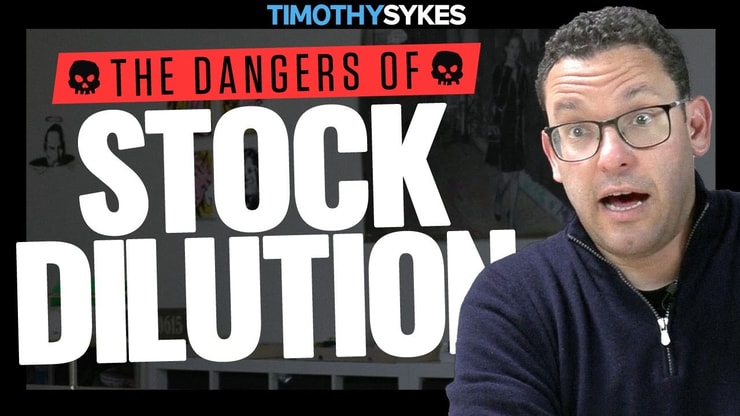A dilution tracker is a tool traders can use to monitor share supply. The supply of a stock is a major factor in the share price.
As traders, our goal is to profit from volatile price changes.
It stands to reason any tool that helps us predict the share supply can help us plan profitable trades.
Here’s the main issue …
The stocks in our niche provide volatile and lucrative trade setups. But the companies are garbage. They’re also looking to make money by selling more shares and diluting the float (share supply).
I’ve been in the industry for over 20 years. I see stocks do this every single month.
When they dilute the float. The price drops. That’s why dilution trackers are helpful.
No matter your strategy, this topic is important if you’d like to trade successfully.
For example, I have over 30 millionaire students right now. Some of them buy long. Some of them sell short.
In both cases, dilution can make or break a trade.
Don’t worry. I’ve been teaching students for over a decade. I can show you everything you need to know.
Let’s get to it …
Table of Contents
- 1 What Is Dilution Tracker?
- 2 Understanding the Industry’s Most Authoritative Source of Dilution Data
- 3 Features of the Dilution Tracker Tool
- 4 Insights Into Dilution
- 5 Understanding Dilution Tracker as a Tool for Investor Success
- 6 What Type of Trader Is Dilution Tracker Best For?
- 7 Evaluating the Dilution Tracker Tool
- 8 Pros & Cons of Dilution Tracker
- 9 Key Takeaways
- 10 FAQs
What Is Dilution Tracker?
The dilution tracker is more than just a form of analysis; it’s an integral part of a trader’s toolkit. It allows you to track the process of dilution, which involves increasing the number of shares in a company without necessarily boosting its value.
Understanding the dilution process means you’re one step ahead of its effects on stock price and company value. It’s not just about observing; it’s about anticipating and making informed decisions.
If you still don’t understand the dangers of stock dilution, watch my video below …
The dilution tracker is about tapping into the essential characteristics of companies and markets and utilizing that data to your advantage.
While mastering the use of the dilution tracker, it’s also crucial to have realistic expectations about your potential earnings as a day trader.
The income of day traders can vary widely based on numerous factors, including experience, strategy, and the tools they use. It’s not a one-size-fits-all answer, and the potential earnings can fluctuate significantly.
To gain a deeper understanding of the earning potential in day trading, consider exploring this detailed article on how much day traders make. It provides valuable insights into the factors that can influence a day trader’s earnings.
Understanding the Industry’s Most Authoritative Source of Dilution Data

When it comes to understanding the industry’s trends, having the right tools is essential.
The dilution tracker provides access to the most authoritative dilution data in the market, representing an accurate snapshot of the diluting effects in public companies.
It’s more than just a tool — it’s a lifeline for investors seeking to understand the complexities of the industry.
With an account in dilution tracker, investors can have access to precise details, position themselves better, and potentially avoid the problems tied to unexpected dilution of shares.
Features of the Dilution Tracker Tool
The dilution tracker tool is a vital instrument designed to give investors an edge.
With features such as …
- real-time alerts
- proprietary dilution ratings
- advanced analytics
It helps us understand potential stock offerings, it also offers traders a unique perspective on how dilution will affect a company’s shares.
By utilizing these tools, traders can improve both their short timing and overall stock selection, getting ahead of changes that could influence the value of the stocks they track.
There are a lot of different options out there. I use StocksToTrade because I designed it specifically to fit my needs.
I needed software that helped me profit off volatile runners. And StocksToTrade has all the tools I need.
Try the StocksToTrade 14-day trial for just $7.
A trader is only as good as their tools.
Check for Possible Offerings
Dilution doesn’t happen randomly. The tracker allows investors to check for possible offerings, thus shedding light on the amount and ratio of shares to be diluted.
This ability to anticipate offerings can have a significant impact on stock selection, positioning, and, ultimately, results.
Proprietary Dilution Rating
Understanding the dilution process is not a simple task.
That’s why the dilution tracker provides a proprietary dilution rating. It quantifies the aspects of dilution for you, distilling complex data into actionable insights.
More Breaking News
- Pagaya Technologies Sees Stock Fluctuations Amid Strategic Moves
- FMC Plans Debt Reduction and Strategic Growth Initiatives for 2026
- Sezzle Inc. Sets New CFO, Anticipates Financial Empowerment Initiatives
- Exponent Sees Promising Growth with Dividend Increase and Upbeat Q4 Earnings
Dilution Alerts
Timing is a critical part of trading.
With the dilution tracker’s alert feature, you’re not only tracking dilutions, but you’re also receiving real-time notifications.
These alerts can serve as a valuable heads-up, ensuring that you are aware of significant changes in your stock.
Improve Short Timing
Short timing can be a gamble without the right tools.
The tracker helps in improving short timing by offering a comprehensive analysis of diluted shares, adding depth to your ability to make decisions.
Improve Stock Selection
Choosing the right stock isn’t about luck; it’s about having the right information.
The dilution tracker supports investors in stock selection by providing in-depth insights into the dilution characteristics of various companies.
Insights Into Dilution

Dilution isn’t a random occurrence; it’s a calculated process by companies, and its effects on shares can be profound.
With the right tools like the dilution tracker, you can not only observe this phenomenon but understand its basis and potential effects.
Understanding dilution isn’t just for the experts; it’s for any trader or investor who recognizes the importance of detail and the value of anticipatory insight.
All my students have to learn the importance of detail. For new traders, it can be a grueling process. They don’t teach this stuff in school. The stock market is a big place with a lot of jargon.
That’s why I created the Challenge. It’s a one-way ticket to success for any trader with the right mindset.
All of my millionaire students come from the Challenge.
There are a lot of things you need to know …
By understanding the aspects of dilution and the tools available to track it, you can stay ahead in the market.
Understanding Dilution Tracker as a Tool for Investor Success
Investor success, like trading, often hinges on having the right tools at your disposal.
The dilution tracker can be that essential tool. By helping investors understand the ins and outs of dilution and its effect on stock prices, it guides them toward making informed calls.
Whether it’s making educated choices on runners or getting critical details that drive alpha, the dilution tracker is positioned to support investors in optimizing their strategies.
But truthfully … it’s not the main indicator I use.
Watch the video below for the most important indicator in my arsenal.
Using Dilution Tracker to Make Informed Calls on Runners
Success in trading comes from making informed calls.
Dilution tracker offers the content and tools to understand dilution in various stocks, helping you make better decisions on which ones are likely to be the “runners.”
Using Dilution Tracker to Get The Critical Details That Drive Your Alpha
Alpha is what every trader strives for. It’s that edge, that extra something that sets you apart.
The dilution tracker can be a key part of your strategy to acquire those critical details that help you achieve better performance.
What Type of Trader Is Dilution Tracker Best For?
Who benefits most from the dilution tracker? It’s designed for the committed trader, someone who values the intricate details and understands that knowledge is power.
Whether analyzing a single stock or an entire industry, the ability to understand and anticipate dilution is crucial.
It’s a tool for those who are not just interested in the surface-level information but crave a deeper understanding of companies, shares, and the entire process of dilution.
The dilution tracker doesn’t just add to your toolkit; it enhances it.
While the dilution tracker is designed for committed traders, it’s also essential to understand the different types of trading accounts.
For instance, the choice between a margin account and a cash account can significantly impact your trading strategy and potential returns. A margin account allows you to borrow money for buying stocks, while a cash account limits you to the cash you have on hand.
Each has its advantages and disadvantages. To make an informed decision, consider reading this comprehensive comparison of margin accounts versus cash accounts.
Evaluating the Dilution Tracker Tool

Evaluation of the dilution tracker tool reveals its robustness and value as an investment aid. It’s not just about the pricing options that cater to different needs, or its ease of use that ensures a smooth user experience.
It’s the platform’s unique focus on dilution data, its security, and the distinct features that set it apart. This tool presents a substantial advantage for those wanting to dig deeper into the dynamics of dilution in stock trading.
Dilution Tracker Pricing Options
Investing in the right tools is part of smart trading.
The dilution tracker offers various pricing options, allowing investors to choose the level of service that fits their needs. Whether you’re a beginner or an experienced trader, there’s an option for you.
Dilution Tracker Platform Differentiators
What sets the dilution tracker apart? Its unique focus on dilution and the ability to provide insights that are often overlooked.
These differentiators make it a standout in the market, a tracer dilution tool like no other.
Dilution Tracker Ease of Use
Trading can be complex, but tools shouldn’t be.
The dilution tracker is designed with user experience in mind. Access to dilution data, analysis, and insights are just a few clicks away, making it a valuable addition to any trader’s toolbox.
Dilution Tracker Security
In today’s digital age, security is paramount.
The dilution tracker takes this seriously, offering robust security measures to protect your data and ensure that your experience is not just insightful but also secure.
Pros & Cons of Dilution Tracker

Like any tool, the dilution tracker has its pros and cons.
On the positive side, its specialization in dilution, real-time insights, and a rich array of features make it a valuable addition to a trader’s toolkit.
On the downside, newcomers to the concept of dilution might find it challenging at first, and some might find the cost of premium features a barrier.
Yet, for those serious about understanding and leveraging dilution in their trading, the dilution tracker offers an unparalleled opportunity.
Pros of Using Dilution Tracker
In-depth Analysis: Access to in-depth analysis of dilution across companies.
Real-time Alerts: Timely alerts to keep you ahead of the market.
User Friendly: Ease of use that doesn’t compromise on depth.
Cons of Using Dilution Tracker
Cost: Depending on the type of account, the cost may be a consideration.
Learning Curve: Some users may need time to fully utilize the platform.
Key Takeaways

Understanding dilution is essential for any serious investor. It’s a core aspect of trading that can impact your stocks, your value, and your results.
The dilution tracker tool brings this understanding to your fingertips, offering a comprehensive view of the market and the forces at play.
The tool is not just a tracker but a comprehensive platform designed for those who are serious about understanding the intricacies of the market.
Whether you are looking at the broad picture of industry trends or the specific details of a company’s stock, a dilution tracker provides the insights necessary to make informed decisions.
The investment in this tool is more than just a cost; it’s an addition to your trading arsenal that can bring a new level of understanding and control over your investments.
Trading isn’t rocket science. It’s a skill you build and work on like any other. Trading has changed my life, and I think this way of life should be open to more people…
I’ve built my Trading Challenge to pass on the things I had to learn for myself. It’s the kind of community that I wish I had when I was starting out.
We don’t accept everyone. If you’re up for the challenge — I want to hear from you.
Apply to the Trading Challenge here.
Trading is a battlefield. The more knowledge you have, the better prepared you’ll be.
Do you use diamond pattern trading in your trading strategy? Let me know in the comments — I love hearing from my readers!
FAQs
How Does Dilution Tracker Help in Trading?
The dilution tracker aids in trading by providing real-time insights into the dilution process in companies.
It allows traders to anticipate and react to changes in the number of shares, thus influencing the stock’s price and value. The tracker’s features, such as dilution alerts and proprietary dilution rating, are tailored to enhance stock selection and timing.
How Secure Is the Dilution Tracker Platform?
Security is a priority for the dilution tracker platform.
The platform incorporates robust security measures to ensure that user data is protected. From account creation to daily use, every part of the process has been designed to provide a secure experience.
What Makes Dilution Tracker Stand Out From Other Trading Tools?
The dilution tracker sets itself apart by focusing exclusively on the process of dilution, providing comprehensive analysis, real-time alerts, and proprietary ratings.
Unlike generic tools, the dilution tracker caters specifically to the needs of investors who want to understand and anticipate the effects of dilution on stocks.
Some traders use it, some don’t. You’ll have to conduct your own experiments to see whether it’s useful for your strategy.





Leave a reply